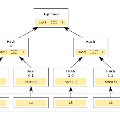The importance of swarm robotics systems in both academic research and real-world applications is steadily increasing. However, to reach widespread adoption, new models that ensure the secure cooperation of large groups of robots need to be developed. This work introduces a novel method to encapsulate cooperative robotic missions in an authenticated data structure known as Merkle tree. With this method, operators can provide the "blueprint" of the swarm's mission without disclosing its raw data. In other words, data verification can be separated from data itself. We propose a system where robots in a swarm, to cooperate towards mission completion, have to "prove" their integrity to their peers by exchanging cryptographic proofs. We show the implications of this approach for two different swarm robotics missions: foraging and maze formation. In both missions, swarm robots were able to cooperate and carry out sequential operations without having explicit knowledge about the mission's high-level objectives. The results presented in this work demonstrate the feasibility of using Merkle trees as a cooperation mechanism for swarm robotics systems in both simulation and real-robot experiments, which has implications for future decentralized robotics applications where security plays a crucial role such as environmental monitoring, infrastructure surveillance, and disaster management.
翻译:在学术研究和现实世界应用中,群装机器人系统的重要性正在稳步提高,然而,为了实现广泛采用,需要开发新的模式,以确保大型机器人群体的安全合作。这项工作引入了一种新的方法,将合作型机器人任务包在一个称为Merkle树的数据结构中。使用这种方法,操作者可以在不披露其原始数据的情况下提供群装机器人任务的“蓝图”而无需披露其原始数据。换句话说,数据核查可以与数据本身分开。我们建议建立一个系统,让在群装机器人的机器人为完成任务而进行合作,我们必须通过交换加密证据,向同行“证明”其完整性。我们展示了这一方法对两个不同的群装机器人任务的影响:成形和磁场形成。在这两个任务中,群装机器人能够合作和进行连续操作,而没有明确了解其原始数据。这项工作的结果表明,在模拟和真实机器人实验中,将蜂架机器人系统作为热型机器人系统的合作机制,必须“保证”其完整性。我们展示了这种方法对两种不同的群装机器人任务的影响:成型和磁场结构。在对未来的监测中,对未来关键的监测作用是分散式机器人应用。





